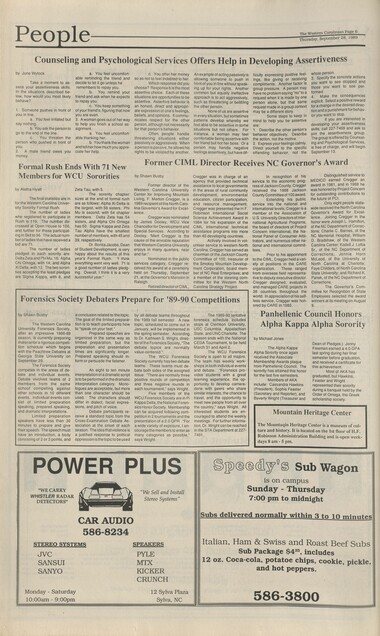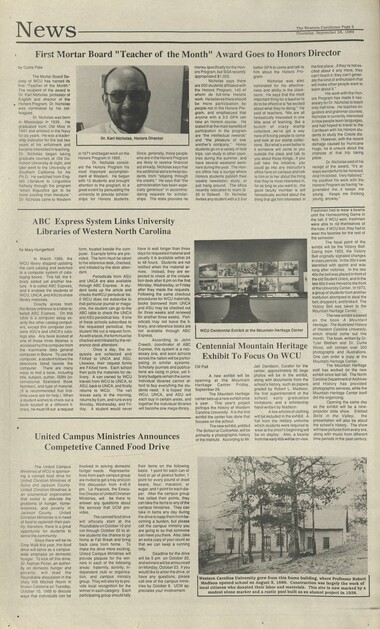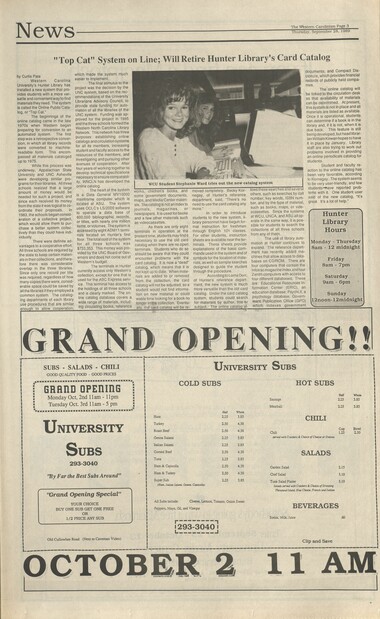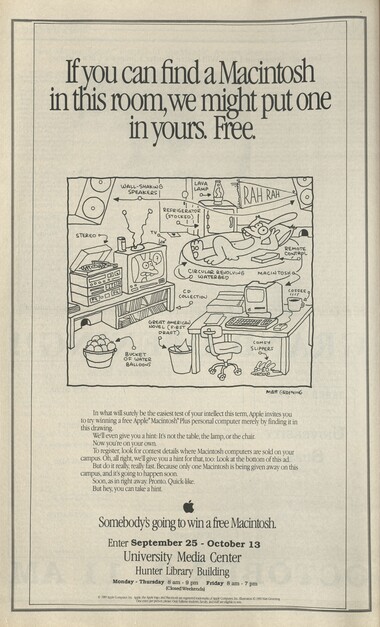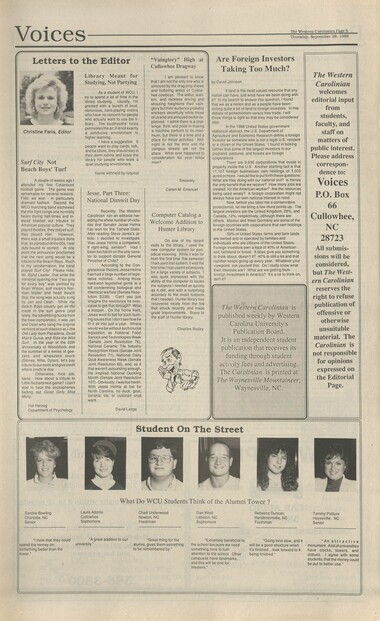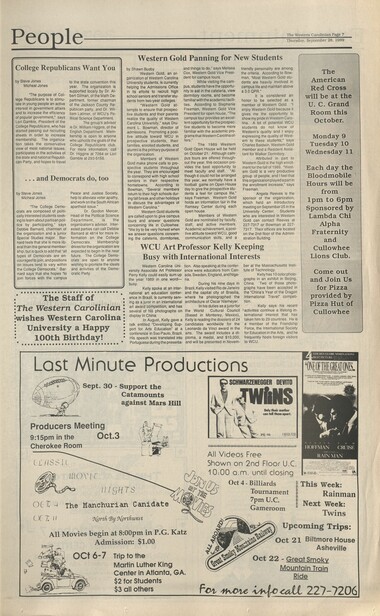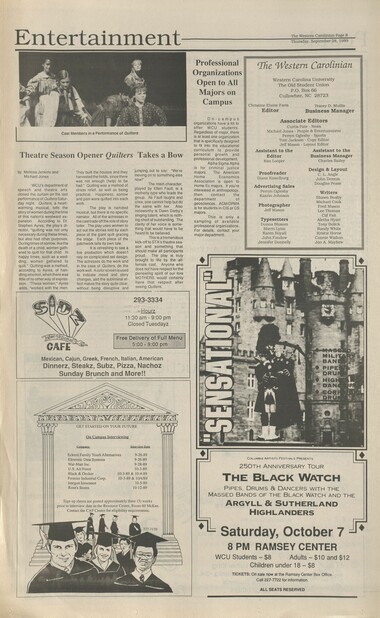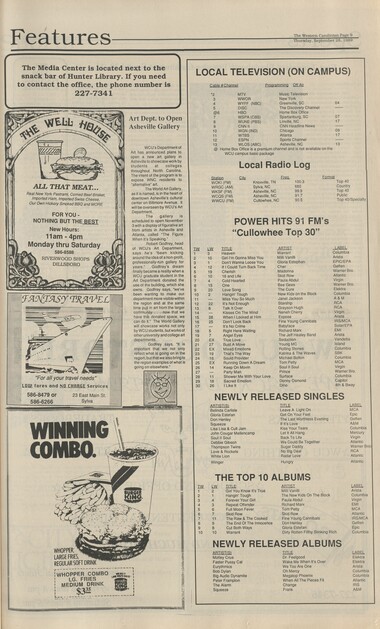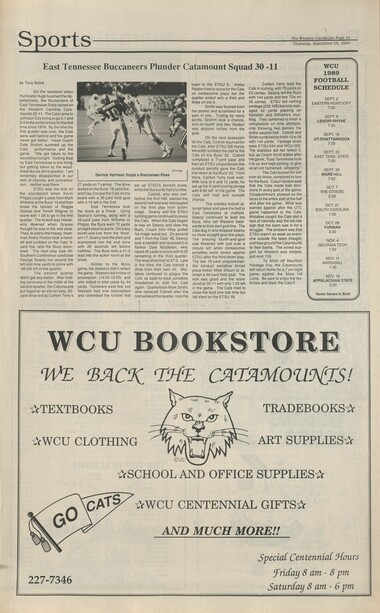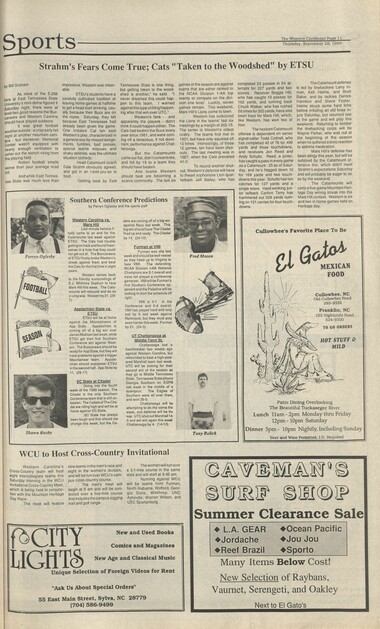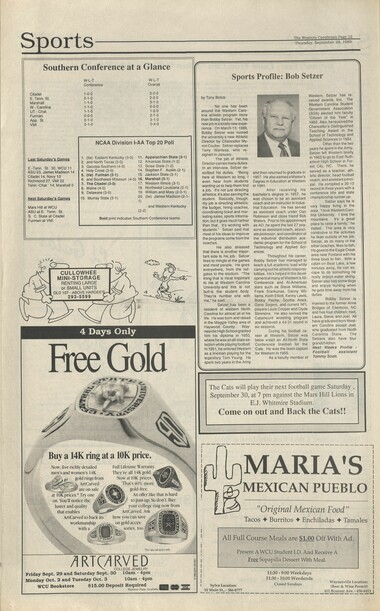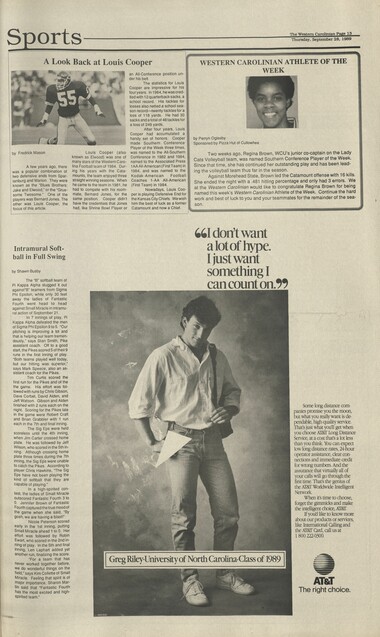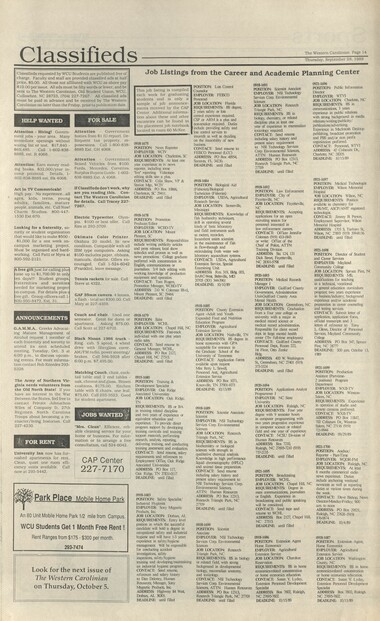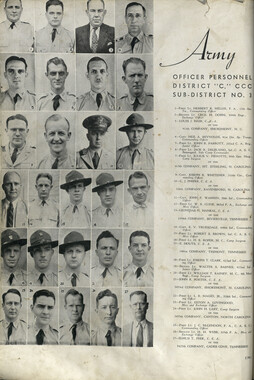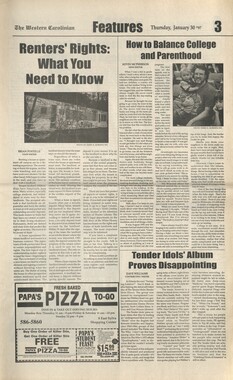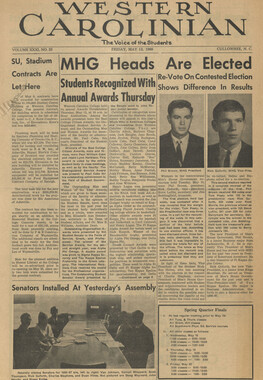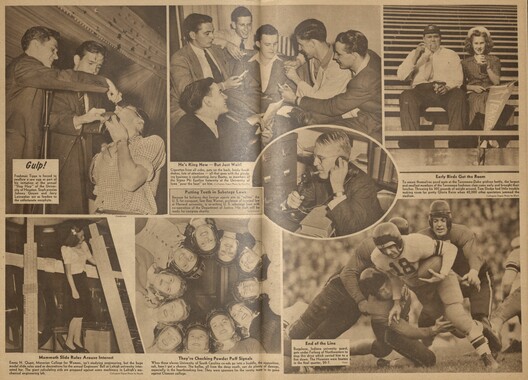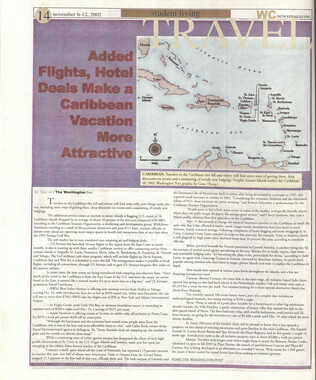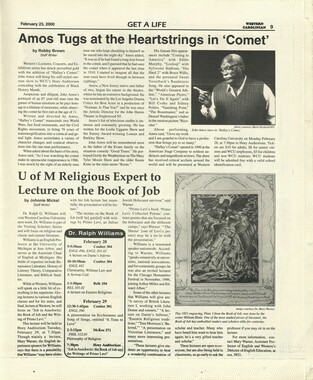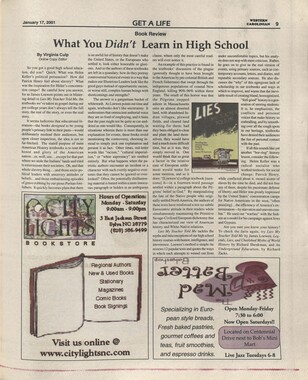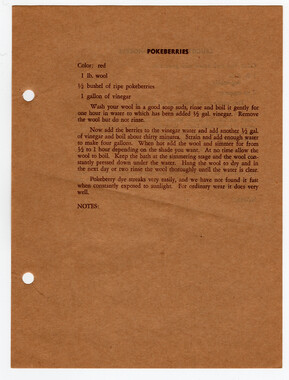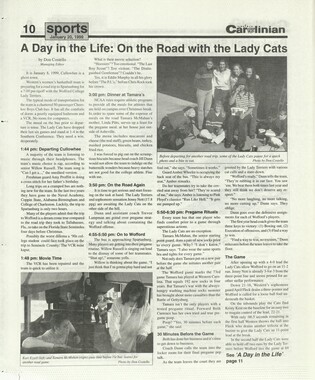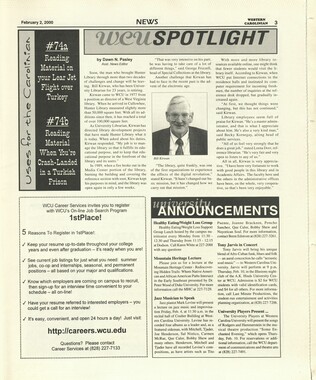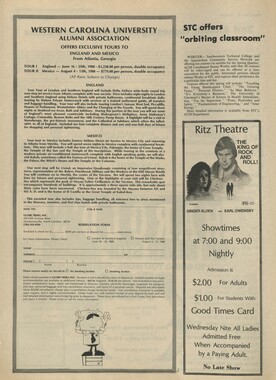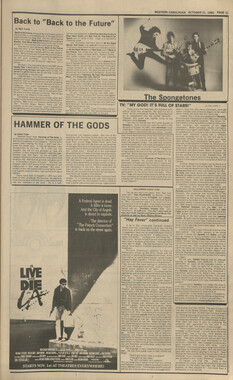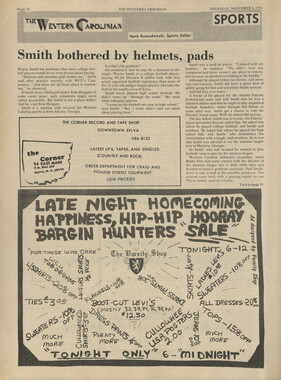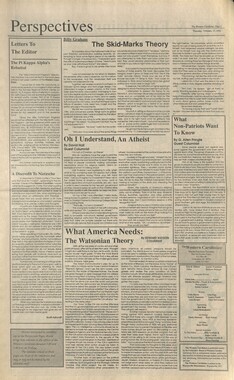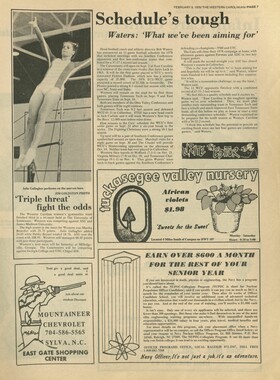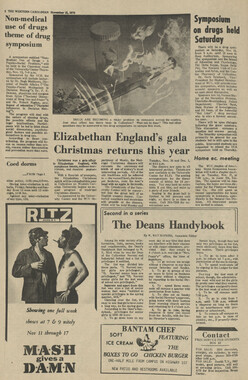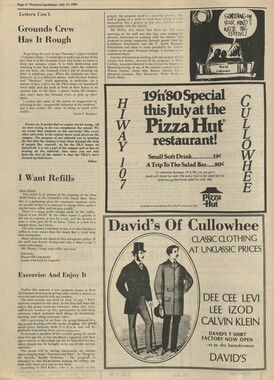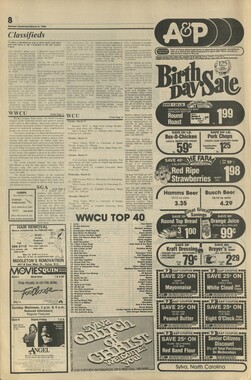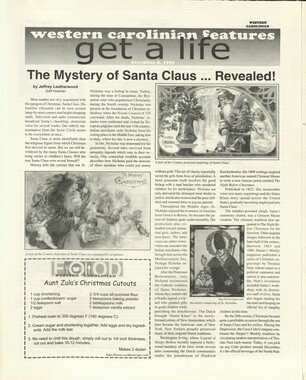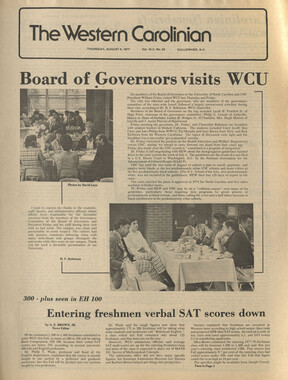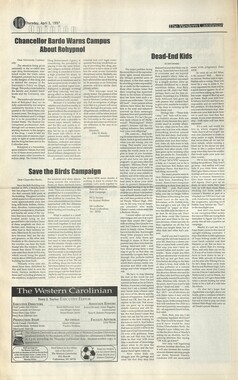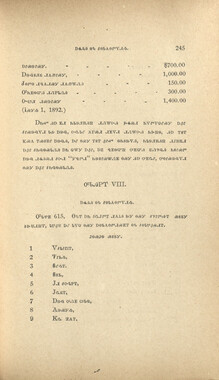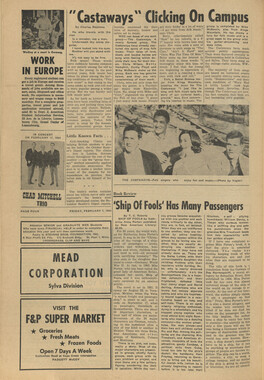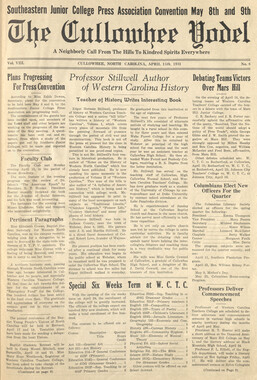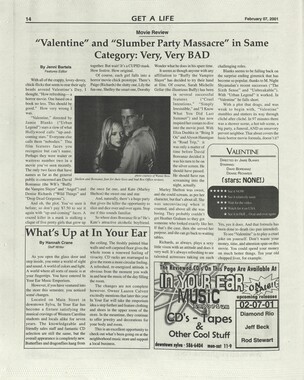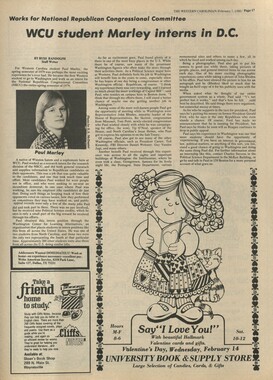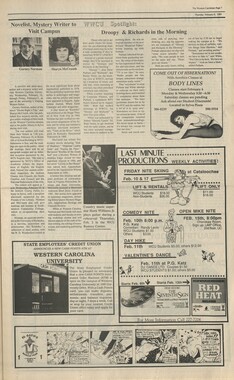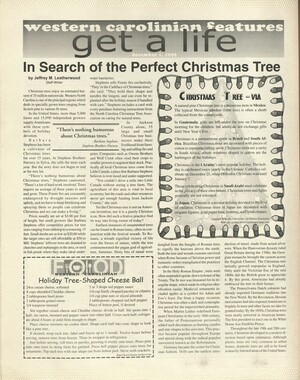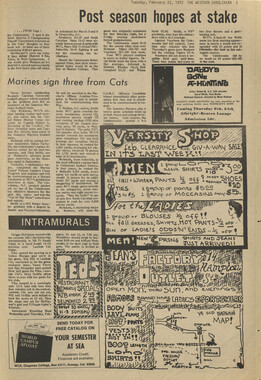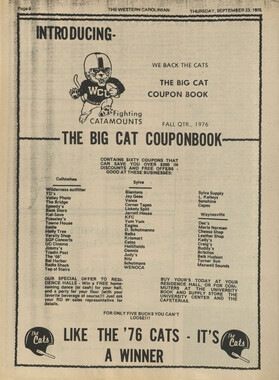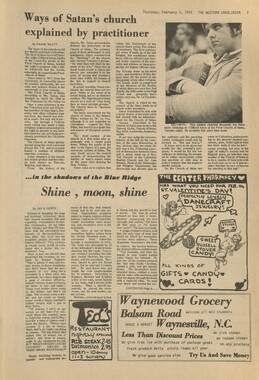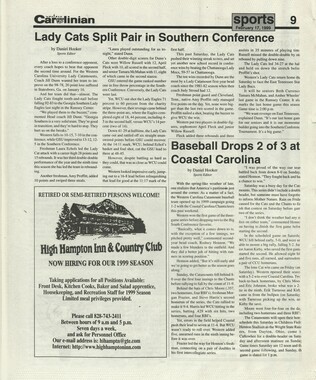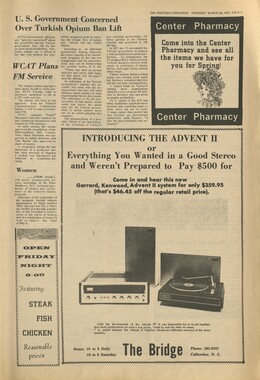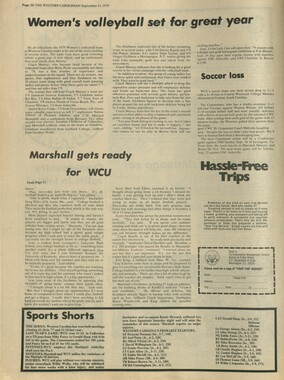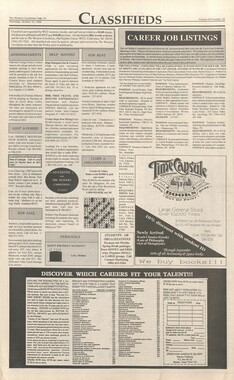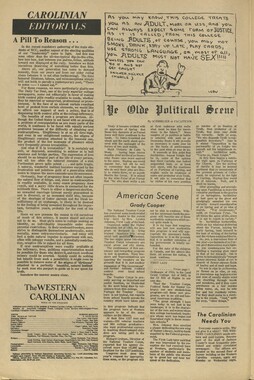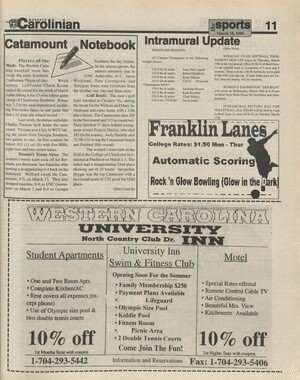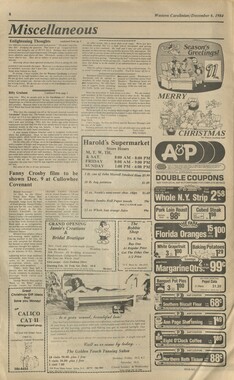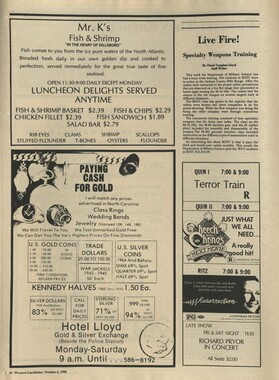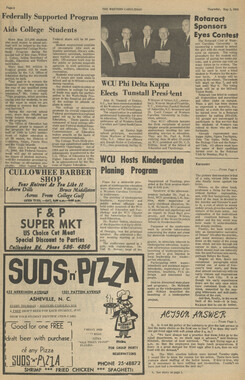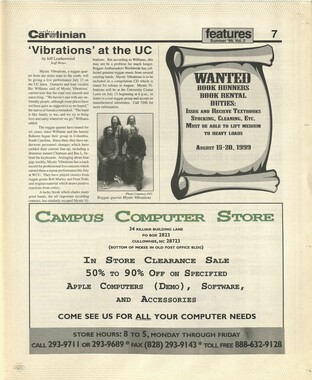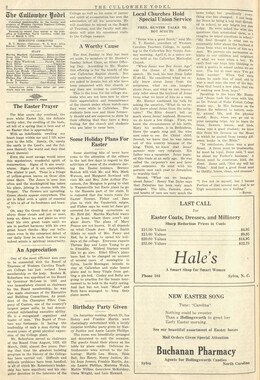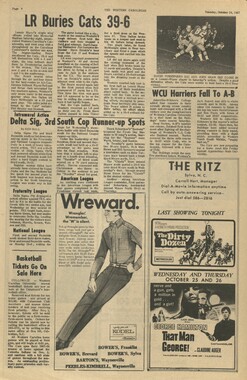Western Carolina University (20)
View all
- Canton Champion Fibre Company (2308)
- Cherokee Traditions (292)
- Civil War in Southern Appalachia (165)
- Craft Revival (1942)
- Great Smoky Mountains - A Park for America (2766)
- Highlights from Western Carolina University (430)
- Horace Kephart (941)
- Journeys Through Jackson (154)
- LGBTQIA+ Archive of Jackson County (85)
- Oral Histories of Western North Carolina (314)
- Picturing Appalachia (6772)
- Stories of Mountain Folk (413)
- Travel Western North Carolina (160)
- Western Carolina University Fine Art Museum Vitreograph Collection (129)
- Western Carolina University Herbarium (92)
- Western Carolina University: Making Memories (708)
- Western Carolina University Publications (2283)
- Western Carolina University Restricted Electronic Theses and Dissertations (146)
- Western North Carolina Regional Maps (71)
- World War II in Southern Appalachia (131)
University of North Carolina Asheville (6)
View all
- Allanstand Cottage Industries (62)
- Appalachian National Park Association (53)
- Bennett, Kelly, 1890-1974 (1388)
- Berry, Walter (76)
- Brasstown Carvers (40)
- Carver, George Washington, 1864?-1943 (26)
- Cathey, Joseph, 1803-1874 (1)
- Champion Fibre Company (233)
- Champion Paper and Fibre Company (297)
- Cherokee Indian Fair Association (16)
- Cherokee Language Program (22)
- Crowe, Amanda (40)
- Edmonston, Thomas Benton, 1842-1907 (7)
- Ensley, A. L. (Abraham Lincoln), 1865-1948 (275)
- Fromer, Irving Rhodes, 1913-1994 (70)
- George Butz (BFS 1907) (46)
- Goodrich, Frances Louisa (120)
- Grant, George Alexander, 1891-1964 (96)
- Heard, Marian Gladys (60)
- Kephart, Calvin, 1883-1969 (15)
- Kephart, Horace, 1862-1931 (313)
- Kephart, Laura, 1862-1954 (39)
- Laney, Gideon Thomas, 1889-1976 (439)
- Masa, George, 1881-1933 (61)
- McElhinney, William Julian, 1896-1953 (44)
- Niggli, Josephina, 1910-1983 (10)
- North Carolina Park Commission (105)
- Osborne, Kezia Stradley (9)
- Owens, Samuel Robert, 1918-1995 (11)
- Penland Weavers and Potters (36)
- Roberts, Vivienne (15)
- Roth, Albert, 1890-1974 (142)
- Schenck, Carl Alwin, 1868-1955 (1)
- Sherrill's Photography Studio (2565)
- Southern Highland Handicraft Guild (127)
- Southern Highlanders, Inc. (71)
- Stalcup, Jesse Bryson (46)
- Stearns, I. K. (213)
- Thompson, James Edward, 1880-1976 (226)
- United States. Indian Arts and Crafts Board (130)
- USFS (683)
- Vance, Zebulon Baird, 1830-1894 (1)
- Weaver, Zebulon, 1872-1948 (58)
- Western Carolina College (230)
- Western Carolina Teachers College (282)
- Western Carolina University (1794)
- Western Carolina University. Mountain Heritage Center (18)
- Whitman, Walt, 1819-1892 (10)
- Wilburn, Hiram Coleman, 1880-1967 (73)
- Williams, Isadora (3)
- Cain, Doreyl Ammons (0)
- Crittenden, Lorraine (0)
- Rhodes, Judy (0)
- Smith, Edward Clark (0)
- Appalachian Region, Southern (2569)
- Asheville (N.C.) (1923)
- Avery County (N.C.) (26)
- Blount County (Tenn.) (161)
- Buncombe County (N.C.) (1672)
- Cherokee County (N.C.) (283)
- Clay County (N.C.) (555)
- Graham County (N.C.) (233)
- Great Smoky Mountains National Park (N.C. and Tenn.) (519)
- Haywood County (N.C.) (3524)
- Henderson County (N.C.) (70)
- Jackson County (N.C.) (4694)
- Knox County (Tenn.) (25)
- Knoxville (Tenn.) (12)
- Lake Santeetlah (N.C.) (10)
- Macon County (N.C.) (420)
- Madison County (N.C.) (212)
- McDowell County (N.C.) (39)
- Mitchell County (N.C.) (132)
- Polk County (N.C.) (35)
- Qualla Boundary (981)
- Rutherford County (N.C.) (76)
- Swain County (N.C.) (2115)
- Transylvania County (N.C.) (270)
- Watauga County (N.C.) (12)
- Waynesville (N.C.) (84)
- Yancey County (N.C.) (72)
- Aerial Photographs (3)
- Aerial Views (60)
- Albums (books) (4)
- Articles (1)
- Artifacts (object Genre) (228)
- Bibliographies (1)
- Biography (general Genre) (2)
- Cards (information Artifacts) (38)
- Clippings (information Artifacts) (191)
- Crafts (art Genres) (622)
- Depictions (visual Works) (21)
- Design Drawings (1)
- Drawings (visual Works) (184)
- Envelopes (73)
- Facsimiles (reproductions) (1)
- Fiction (general Genre) (4)
- Financial Records (12)
- Fliers (printed Matter) (67)
- Glass Plate Negatives (381)
- Guidebooks (2)
- Internegatives (10)
- Interviews (815)
- Land Surveys (102)
- Letters (correspondence) (1013)
- Manuscripts (documents) (618)
- Maps (documents) (177)
- Memorandums (25)
- Minutes (administrative Records) (59)
- Negatives (photographs) (5835)
- Newsletters (1285)
- Newspapers (2)
- Occupation Currency (1)
- Paintings (visual Works) (1)
- Pen And Ink Drawings (1)
- Periodicals (193)
- Personal Narratives (10)
- Photographs (12976)
- Plans (maps) (1)
- Poetry (6)
- Portraits (4533)
- Postcards (329)
- Programs (documents) (151)
- Publications (documents) (2236)
- Questionnaires (65)
- Scrapbooks (282)
- Sheet Music (2)
- Slides (photographs) (402)
- Songs (musical Compositions) (2)
- Sound Recordings (796)
- Specimens (92)
- Speeches (documents) (15)
- Tintypes (photographs) (8)
- Transcripts (322)
- Video Recordings (physical Artifacts) (23)
- Vitreographs (129)
- Text Messages (0)
- A.L. Ensley Collection (275)
- Appalachian Industrial School Records (7)
- Appalachian National Park Association Records (336)
- Axley-Meroney Collection (2)
- Bayard Wootten Photograph Collection (20)
- Bethel Rural Community Organization Collection (7)
- Blumer Collection (5)
- C.W. Slagle Collection (20)
- Canton Area Historical Museum (2110)
- Carlos C. Campbell Collection (282)
- Cataloochee History Project (64)
- Cherokee Studies Collection (4)
- Daisy Dame Photograph Album (5)
- Daniel Boone VI Collection (1)
- Doris Ulmann Photograph Collection (112)
- Elizabeth H. Lasley Collection (1)
- Elizabeth Woolworth Szold Fleharty Collection (4)
- Frank Fry Collection (95)
- George Masa Collection (173)
- Gideon Laney Collection (452)
- Hazel Scarborough Collection (2)
- Hiram C. Wilburn Papers (28)
- Historic Photographs Collection (236)
- Horace Kephart Collection (861)
- Humbard Collection (33)
- Hunter and Weaver Families Collection (1)
- I. D. Blumenthal Collection (4)
- Isadora Williams Collection (4)
- Jesse Bryson Stalcup Collection (47)
- Jim Thompson Collection (224)
- John B. Battle Collection (7)
- John C. Campbell Folk School Records (80)
- John Parris Collection (6)
- Judaculla Rock project (2)
- Kelly Bennett Collection (1407)
- Love Family Papers (11)
- Major Wiley Parris Civil War Letters (3)
- Map Collection (12)
- McFee-Misemer Civil War Letters (34)
- Mountain Heritage Center Collection (4)
- Norburn - Robertson - Thomson Families Collection (44)
- Pauline Hood Collection (7)
- Pre-Guild Collection (2)
- Qualla Arts and Crafts Mutual Collection (12)
- R.A. Romanes Collection (681)
- Rosser H. Taylor Collection (1)
- Samuel Robert Owens Collection (94)
- Sara Madison Collection (144)
- Sherrill Studio Photo Collection (2558)
- Smoky Mountains Hiking Club Collection (616)
- Stories of Mountain Folk - Radio Programs (374)
- The Reporter, Western Carolina University (510)
- Venoy and Elizabeth Reed Collection (16)
- WCU Gender and Sexuality Oral History Project (32)
- WCU Mountain Heritage Center Oral Histories (25)
- WCU Oral History Collection - Mountain People, Mountain Lives (71)
- WCU Students Newspapers Collection (1744)
- Western North Carolina Tomorrow Black Oral History Project (69)
- William Williams Stringfield Collection (2)
- Zebulon Weaver Collection (109)
- African Americans (390)
- Appalachian Trail (35)
- Artisans (521)
- Cherokee art (84)
- Cherokee artists -- North Carolina (10)
- Cherokee language (21)
- Cherokee pottery (101)
- Cherokee women (208)
- Church buildings (170)
- Civilian Conservation Corps (U.S.) (110)
- College student newspapers and periodicals (1830)
- Dams (107)
- Dance (1023)
- Education (222)
- Floods (61)
- Folk music (1015)
- Forced removal, 1813-1903 (2)
- Forest conservation (220)
- Forests and forestry (1184)
- Gender nonconformity (4)
- Great Smoky Mountains National Park (N.C. and Tenn.) (181)
- Hunting (38)
- Landscape photography (25)
- Logging (118)
- Maps (83)
- Mines and mineral resources (8)
- North Carolina -- Maps (18)
- Paper industry (38)
- Postcards (255)
- Pottery (135)
- Railroad trains (71)
- Rural electrification -- North Carolina, Western (3)
- School integration -- Southern States (2)
- Segregation -- North Carolina, Western (5)
- Slavery (5)
- Sports (452)
- Storytelling (244)
- Waterfalls -- Great Smoky Mountains (N.C. and Tenn.) (66)
- Weaving -- Appalachian Region, Southern (280)
- Wood-carving -- Appalachian Region, Southern (328)
- World War, 1939-1945 (173)
Western Carolinian Volume 55 Number 06
Item
Item’s are ‘child’ level descriptions to ‘parent’ objects, (e.g. one page of a whole book).
-
-
People The Western Carolinian Page 6 Thursday. September 28, 1989 Counseling and Psychological Services Offers Help in Developing Assertiveness by June Wytock Take a moment to assess your assertiveness skills. In the situations described below, how would you most likely behave? 1. Someone pushes in front of you in line. a. You feel irritated but say nothing. b. You ask the person to go to the end of the line. c. You threaten the person who pushed in front of you. 2. A male friend owes you money. a. You feel uncomfortable reminding the friend and decide to let it go unless he remembers to repay you. b. You remind your friend and ask when he expects to repay you. c. You keep something of your friend's, figuring that now you are even. 3. Awomangoesoutof her way to help you finish a school assignment. a. You feel uncomfortable thanking her. b. You thank the woman and tell her how much you appreciate her help. c. You offer her money so as not to feel indebted to her. Which response did you choose? Response bis the most assertive choice. Each of these situations are opportunities to be assertive. Assertive behavior is an honest, direct and appropriate expression of one's feelings, beliefs, and opinions. It communicates respect for the other person, although not necessarily for that person's behavior. Often people handle threatening situations either passively or aggressively. When a person is passive, he allows his rights to be violated'by another. An example of acting passively is allowing someone to push in front of you in line without speaking up for your rights. Another common but equally ineffective approach is to act aggressively, such as threatening or belittling the other person. None of us are assertive in every situation, but sometimes patterns develop whereby we feel able to be assertive in some situations but not others. For instance, a woman may feel comfortable being assertive with her friend but not her boss. Or a person may handle negative feelings assertively, but have dif ficulty expressing positive feelings, like giving or receiving compliments. Another factor is group pressure. A person may have no problem saying "no" to a request when it is made by one person alone, but that same request made in a group context may be a different story. Some steps to keep in mind to help you be assertive are: 1. Describe the other person's behavior objectively. Describe the action, not the motive. 2. Express your feelings calmly. Direct yourself to the specific offending behavior, not the whole person. 3. Specify the concrete actions you want to see stopped and those you want to see performed. 4. Make the consequences explicit. Select a positive reward for a change in the desired direction and a punishment for behavior you want to stop. If you are interested in developing your assertiveness skills, call 227-7469 and ask to join the assertiveness group. The group is offered by Counseling and Psychological Services, is free of charge, and will begin September 13. Formal Rush Ends With 71 New Members for WCU Sororities Former CIML Director Receives NC Governor's Award by Aletha Hyatt The final statistics are in for the Western Carolina University Sorority Formal Rush. The number of ladies who registered to participate in Rush is 119. The number decreased at Open House to 106, and further for those participating in Skit to 96. The actual number of ladies that have received a bid are 71. The number of ladies pledged in each sorority are: DeltaZetaand Phi Mu, 16: Alpha Chi Omega, with 14; and Alpha Xi Delta, with 12. The two sororities accepting the least pledges are Sigma Kappa, with 8, and Zeta Tau, with 5. The sorority chapter sizes at the end of formal rush are as follows: Alpha Xi Delta is the largest, with 56 sisters. Phi Mu is second, with 54 chapter members. Delta Zeta has 54 sisters, and Alpha Chi Omega has 50. Sigma Kappa and Zeta Tau Alpha have the smallest numberof members, with 45 and 39, respectively. Dr. Bonita Jacobs, Dean of Student Development, is very happy about the results of this year's Formal Rush. "I think everything went very well. 71 is a good number of ladies pledging. Overall, I think it is a very successful year." by Shawn Busby Former director of the Western Carolina University Center for Improving Mountain Living, F. Merton Cregger, is a 1989 recipient of the North Carolina Governor's Award for Excellence. Cregger was nominated by James Dooley, WCU Vice Chancellorfor Development and Special Services. According to Dooley, "Mert Cregger is the cause of the enviable reputation that Western Carolina University enjoys in many quarters, near and far." Nominated in the public services category, Cregger received his award at a ceremony held on Thursday, September 21, at the Governor's Mansion in Raleigh. Retired directorof CIML, Cregger was in charge of an agency that provided technical assistance to local governments in the areas of rural community development, environmental education, citizen participation, and resource management. Cregger was presented the H.F. Robinson International Social Science Achievement Award in 1984 for his expansion of the CIML international technical assistance programs into more than 40 developing countries. Actively involved in volunteer service to western North Carolina, Cregger has served as chairman of the Jackson County Committee of 100; treasurer of the Smokey Mountain Development Corporation, board member of NC Real Enterprises; and a member of the steering committee for the Western North Carolina Strategy Project. Forensics Society Debaters Prepare for '89-90 Competitions by Shawn Busby The Western Carolina University Forensics Society, after an impressive 1988-89 season, is currently preparing material for a rigorous competition schedule which begins with the Peachtree Debates at Georgia State University on September 29. The Forensics Society competes in the areas of debate and individual events. Debate involves teams of 2 members from the same school competing against other schools in 10 different events. Individual events consist of limited preparation speaking, prepared speaking, and dramatic interpretations. Limited preparation speakers have less than 30 minutes to prepare and give their speech. The speech must have an introduction, a body consisting of 2 or 3 points, and a conclusion related to the topic. The goal of the limited preparation is to teach participants how to "speak on your feet." Prepared speeches are organized in the same way as limited preparation, but the preparation and presentation times are significantly longer. Prepared speaking should inform or persuade the listener. An eight to ten minute interpretation of a dramatic script is to be performed in the dramatic interpretation category. Monologues are acceptable, but more than one character should be used. The characters should differ in dialect, facial expressions, and pitch of voice. Debate participants receive a standard topic from the Cross-Examination Debate Association at the onset of each season. Theideathatviolenceis a justified response to political oppression is the topic to be used by all debate teams throughout the 1989 fall semester. A new topic, scheduled to come out in January, will be implemented in the spring semester. According to Dr. Kathleen S. Wright, directorof the Forensics Society, "The debate topics are normally value-centered." The WCU Forensics Society currently has two debate teams. These teams must debate both sides of the assigned issue. "There are normally three positive rounds of competition and three negative rounds in each tournament," says Wright. Five members of the WCU Forensics Society are in Pi Kappa Delta, the National Forensics Honor Society. Membership can be acquired following competition in 2 tournaments and the presentation of a 2.0 QPR. "For a wide variety of exposure, I encourage the members to enter as many categories as possible," says Wright. The 1989-90 tentative forensics schedule includes stops at Clemson University, USC Columbia, Appalachian State, and UNC Charlotte. The season ends with the National CEDA Tournament, to be held March 31 and April 2. The WCU Forensics Society is open to all majors. The team has weekly workshops in both individual events and debate. "Forensics provides students with a great learning experience, the opportunity to develop camaraderie with peers who share similar interests, the chance to travel, and the opportunity to meet new people from all over the country," says Wright. All interested students are encouraged to attend the weekly meetings. For further information, Dr. Wright can be reached in the STA Department at 227- 7491. In recognition of his service to the economic progress of Jackson County, Cregger received the 1988 Jackson County Committee of 100 award. Extending his public service into the national and international levels, Cregger is a member of the Association of U.S. University Directors of International Agricultural Programs, the board of directors of Project Concern International, the National Panel of Consumer Arbitrators, and numerous other national and international committees. Prior to his appoinment to the CIML, Cregger held a variety of positions in the CARE organization. These ranged from overseas field representative to deputy executive director. Cregger designed, evaluated, and managed CARE projects in 38 countries throughout the world. In appreciation of his selfless service, Cregger was honored by CARE in 1980. Distinguished service to MEDICO earned Cregger an award in 1981, and in 1988 he was honored by Project Concern for outstanding contributions to the future of PCI. Only eight people statewide received the North Carolina Governor's Award for Excellence. Joining Cregger in the honor were Joseph L. Hamilton, of the NC Department of Corrections; Charlie C. Barnes, of the NC Memorial Hospital; William D. Bradshaw, of the Western Carolina Center; Kodell J. Loftis Sr., of the NC Department of Corrections; Jonnie Horn McLeod, of the University of North Carolina at Charlotte; Faye Childers, of North Carolina State University; and Richard K. Panek, of the NC Department of Corrections. The Governor's Committee for Recognition of State Employees selected the award winners at its meeting on August 9. Panhellenic Council Honors Alpha Kappa Alpha Sorority by Michael Jones The Alpha Kappa Alpha Sorority once again received the Associate Membership Awards plaque from Panhellenic Council. The sorority has attained this honor for the last five semesters. Members of AKA include: Cassandra Hawkins (President), Sophis Feaster (Secretary and Reporter), and Beverly Wright (Treasurer and Dean of Pledges.) Jenny Freeman earned a 4.0 GPA last spring during her final semester before graduation, and received a certificate for this achievement. Most of AKA has graduated, but Hawkins, Feaster and Wright represented their sorority during a banquet held by the Order of Omega, the Greek scholarship society. Mountain Heritage Center The Mountaqin Heritage Center is a museum of culture and history. It is located on the 1st floor of H.F. Robinson Administration Building and is open weekdays 8 am - 5 pm. POWER PLUS "WE CARRY WHISTLER RADAR DETECTORS" "We Sell and Install Stereo Systems" CAR AUDIO 586-8234 STEREO SYSTEMS JVC SANSUI SANYO Monday - Saturday 10:00am - 9:00pm SPEAKERS PYLE MTX KICKER CRUNCH 12 Sylva Plaza Sylva, NC ,9 Sub Wagon is on campus Sunday - Thursday 7:00 pm to midnight Subs delivered normally within 3tn in minutpc Italian, Ham & Swiss and Roast Beef Subs Sub Package $425, includes 12 oz. Coca-cola, potatoe chips, cookie, pickle, and hot peppers. 586-3800
Object
Object’s are ‘parent’ level descriptions to ‘children’ items, (e.g. a book with pages).
-
The Western Carolinian is Western Carolina University's student-run newspaper. The paper was published as the Cullowhee Yodel from 1924 to 1931 before changing its name to The Western Carolinian in 1933.
-
